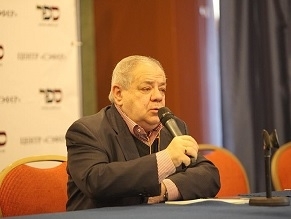|
Euroasian Jewish News

EAJC Secretary General, Sefer Center Academic Board Chairman Dr. Michael Chlenov at conference opening ceremony (photo by N. Buslayev)
|
XXI International Conference on Jewish Studies Held in Moscow
06.02.2014, Community Life On February 3-5, the Sefer Center for the University Teaching of Jewish Civilization held its traditional international Jewish Studies conference. The Sefer Center is a part of the Euro-Asian Jewish Congress, and is directed by EAJC General Council member, Dr. Victoria Mochalova. Its Academic Board Chairman is Euro-Asian Jewish Congress Secretary General, professor Michael Chlenov. The EAJC was once again one of the major conference sponsors together with the JDC, the Genesis Fund, and the Russian Jewish Congress.
The conference gathered over 200 experts in Jewish studies from 14 countries: historians, anthropologists, linguists, political studies experts, and representatives of international and local Jewish organizations. The number of topics in the plenary meetings and the panels was extremely broad, including such topics as: “Jews in Soviet, anti-Soviet, and post-Soviet contexts: questions of identity”; “Jews and the peoples surrounding them”; “Jewish languages: linguistics and intellectual history”; “Jewish culture: intellectual and historic contexts”; “Jews in Eastern Europe”; “Jewish art. Architecture and art.”; “The State of Israel, historically and today. Foreign policy and international relations.”; “Biblical Studies. Ancient Neart East.”
A special panel was dedicated to the 100th anniversary of the American Jewish Joint Distribution Committee, which had actively aided in the creation of the Sefer Center 20 years ago. The EAJC Secretary General, Dr. Michael Chlenov, who had, as Sefer’s Academic Board Chairman, been also chairing the opening and closing ceremony of the conference, noted: “Though we naturally give the JDC their due in helping restore and develop Jewish studies in post-Soviet territory, we must remember that this did not happen in a vacuum. Academic centers for Jewish Studies existed in Leningrad and Tbilisi, and, most importantly, the Independent Jewish movement also existed. Inside that movement, the Jewish Historic-Ethnographic Commission had been created. Thanks to the Commission, academic journals published approximately 50 different articles on Jewish studies from 1981 to 1989; it also held ethnographic expeditions, whose results are valuable even today. It had fostered the Sefer Center, and many of today’s scholars were raised within that Commission.”
|
|
